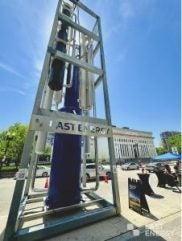
US-based start-up Last Energy is partnering with the NATO Energy Security Centre of Excellence (ENSEC COE) to jointly research military applications for micro-nuclear power technologies and to explore opportunities for future deployment on NATO military installations. It is the first ever agreement between ENSEC COE and a nuclear energy company.
The partnership agreement was signed by Last Energy CEO Bret Kugelmass and ENSEC-COE Director Colonel Darius Uzkuraitis. It underscores a belief in the unique benefits of nuclear energy on the part of both parties and opens the door to future micro-nuclear power plants on NATO military installations. Under the partnership, both parties agree to work on joint projects around nuclear energy applications for NATO military installations and operations.
“Nuclear energy is unequivocally the most reliable, abundant form of power mankind has ever discovered, and it must become the default solution for NATO militaries as they navigate a new era of great power competition,” said Kugelmass. “No other resource is capable of providing the kind of 24/7 energy security that’s mission critical on military bases, but we will only realise that potential if we miniaturise, modularise, and productise nuclear development. We … look forward to creating a roadmap for the adoption of micro-scale nuclear power across NATO installations.”
ENSEC-COE, founded in 2012, is one of 28 NATO-accredited expert bodies that advise member militaries on strategy and technologies in particular fields. The Centre works with partners in industry, academia, and government to research and develop solutions for NATO militaries in order to ensure energy resilience and efficiency as well as critical energy infrastructure safety.
The Centre’s partnership with Last Energy is part of a broader pivot by NATO toward prioritising energy security. In addition to dramatically reducing the cost and timeline of construction, micro-nuclear plants have minimal water requirements and can be sited almost anywhere, allowing for a direct power connection and, by extension, enabling the off-taker to circumvent the traditional bandwidth restraints and price volatility of the grid.
Last Energy, founded in 2019, is developing the PWR-20 micro-nuclear power plant and says it has commercial agreements for over 65 units across Europe. In March 2023 it secured purchase agreements (PPAs) for 34 PWR-20 units with four industrial partners in the UK and Poland. Last Energy said the deals, worth $18.9bn in power sales, mark “the largest pipeline of new nuclear power plants under development in the world”.
Last revealed its completed PWR-20 design in 2022. The PWR-20 is a 20 MWe (60 MWt) single-loop pressurised water reactor (PWR) that has a 300C continuous output based on accepted PWR technology. The design uses standard full-length PWR fuel enriched to 4.95% and closed-cycle air cooling. Power plant modules would be built off-site and assembled in modules. By using ready-made modular components, Last says a reactor could be assembled within 24 months of the final investment decision. The assumed lifetime of the power plant is 42 years.
Because the technology uses a standardised balance of plant configuration and modular construction, Last says a plant could be fully factory fabricated and installed on-site “in as little as three months”. This “simplifies the regulatory process, keeps project costs below $100m, and unlocks both private financing and customer validation”, the company notes. “We cover all aspects of the investment process, including design, construction, financing, service, and operation.”






